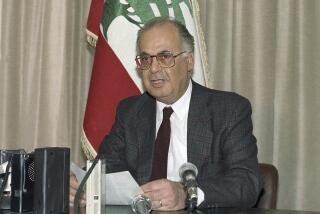Lebanon’s Premier to Step Down : Mideast: Amid political standoffs, frustrated billionaire leader gives up.
- Share via
BEIRUT — Lebanon’s billionaire prime minister, Rafik Hariri, confirmed Friday that he is abandoning his massive plan for reconstruction of the war-torn nation and stepping down amid widespread charges of corruption and political standoffs that have deadlocked his government.
The 51-year-old prime minister, who built a real estate fortune in Saudi Arabia, Europe and the United States and was considered by many the main hope for rebuilding Lebanon, stormed out of an acrimonious Cabinet meeting Thursday night and said he was quitting after two frustrating years as premier.
“God willing, Lebanon will move forward, and a bunch of gamblers and arrogant people will not be able to halt the course of development and reconstruction . . . whether we are in power or not,” Hariri said Friday afternoon. “It is imperative that a government of institutions evolve in Lebanon, rather than a government of outlaws who join the system.”
Hariri is scheduled to meet with Syrian officials this weekend in what some observers said could be a last-ditch move to persuade him to remain in his post.
Syria, with its 40,000 troops in Lebanon, is the nation’s major powerbroker and has backed Hariri since he took over the prime ministry in October, 1992.
No prime minister or head of government in Lebanon can serve without the blessing of Damascus, and Hariri has voiced strong public and policy support for Syria even as he sought to rebuild the nation enough to eventually regain its independence.
The crisis was only the most recent to have rocked Hariri’s government as he sought to launch a 10-year, $12-billion reconstruction program to drag Lebanon out of the ruins of more than a decade of civil war and lure home to Beirut Lebanese citizens and their billions of dollars in assets abroad.
Last May, Hariri locked himself in his residence for a full week in a power standoff with his partners in government. He was frustrated in his bid to reshuffle his Cabinet and reform the civil service administration by opposition from other powerful figures in the government, including President Elias Hrawi and National Assembly Speaker Nabih Berri.
The latest crisis appeared to be triggered by a standoff with labor unions and an array of corruption allegations that have rocked the government over the last two weeks.
The arrest last week of Parliament member Yahya Shamas on charges of drug trafficking was followed by Shamas’ implicating other officials and their relatives, including Hrawi’s son. An opposition deputy accused several politicians of taking kickbacks for votes or favors.
The accusations may have been turned against Hariri himself during Thursday night’s Cabinet session, when Housing Minister Mahmoud abu Hamdan is said to have alleged that Hariri would personally benefit from a $60-million real estate deal proposed for the historic St. Georges Hotel site on the Beirut seafront.
Hariri, with landholdings all over the world and one of the world’s 100 richest men, has frequently been charged with seeking to benefit from the reconstruction of downtown Beirut. He has invested millions of his own money in Lebanese real estate and media holdings but has separated himself from the company undertaking the massive downtown redevelopment project.
His defenders point out that Hariri is one of the few Lebanese who is too rich to try to make money from his political position.
Also feeding the government crisis was a standoff with the labor unions, which rejected a 20% pay raise decreed by the government Thursday and held out for an 80% hike to keep pace with inflation. The unions staged a one-day strike earlier in the week and threatened to step up their protests next week.
Hariri’s resignation, even if it is rescinded, reflects growing frustration on the part of many Lebanese officials with the 1989 Taif agreement that ended Lebanon’s civil war and established the current system of government under which power is supposed to be shared equally by the country’s Sunni Muslim, Shiite Muslim and Christian factions.
Some officials said Hariri’s resignation was triggered mainly by irreconcilable differences with ministers close to Berri. “How can Hariri rule with Berri always against him?” an unnamed Cabinet source told Reuters news agency.
Times special correspondent Raschka reported from Beirut, staff writer Murphy from Cairo.
More to Read
Sign up for Essential California
The most important California stories and recommendations in your inbox every morning.
You may occasionally receive promotional content from the Los Angeles Times.













